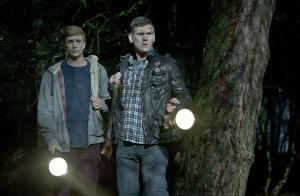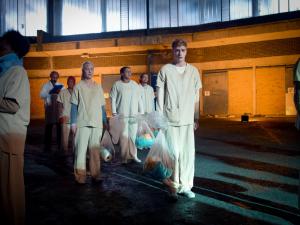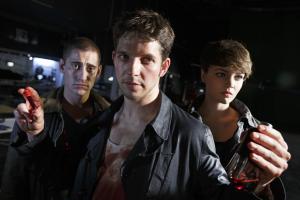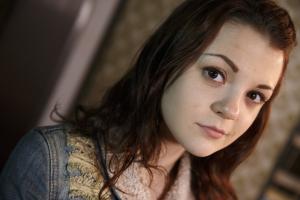In The Flesh: Episode 3
Sunday, 31 March 2013 - Reviewed by
Believe it or not, season finales can have a whiff of the undead about them - if a writer manages to get it right, then there's continual life evident for the show, but if they get it wrong, then equally that failure will inevitably keep coming back to haunt them. Judging by the uneven nature of the first two instalments of In The Flesh - episode one mediocre at best and episode two being good rather than great - the situation for the show's climax could have gone either way, yet thankfully the outcome has turned out for the better. This is unlikely to be anyone's personal pick for "Best TV Drama Of 2013", but there's certainly a marked improvement to leave a satisfying legacy here.
As difficult as it is to "point fingers", as it were, one inevitable contributory factor to the rise in quality has to be the early departure of Emily Bevan's Amy from the equation. Kieren's hunting partner was a rather irritating echo of Being Human's B-list guest characters last week, so for Amy Dyer to at least have a valiant departure in her journey to brighter pastures new was a neat resolution for Bevan's character. Perhaps some viewers would have preferred Amy to have had a more influential role in the proceedings of this episode - quite honestly, though, with everything going on in this breathtaking hour of drama, this reviewer feels that she could easily have been a detrimental distraction.
That's not to say that only the numerous characters who were written out in this final episode allowed for strong cast performances, however. There was always potential for Luke Newberry's protagonist Kieren to develop into a character of immense pathos and intellect, and writer Dominic Mitchell finally allowed Newberry this triumphant portrayal here. The performance was aided in no small measure by Harriet Cains' Jem Walker - whereas Jem proved to be a downright unrealistic narrative construct in the first two episodes, here her eventual familial instinct to protect those closest to her ensured that she became a far more compelling character. Everyone has a sibling relationship of some kind like Kieren and Jem's in their lives these days, be it through blood or work, so it became far easier to empathise with the actions of the younger of the two Walker teens this time around, again thanks to Mitchell placing compelling moral dilemmas right at the viewer's doorstep.
The episode's narrative was certainly more refined than its predecessors too. Whereas episodes one and two were at times layered in structural and emotional clichès that could often become tedious to watch play out again, this finale played on the viewers' expectations in far more innovative ways. Sure, most viewers would have seen Rick's heroic dismissal of his father's antagonism towards "rotters" coming, yet it seems safe to say that the portrayal of his father has been unpredictable enough that it wasn't clear what his next action would be. Of course, perhaps it was inevitable that the man who helped gun down an elderly lady in cold blood simply on the basis of her PDS condition would turn on anyone, regardless of their relationship to him, although that doesn't make Rick's demise and the reaction Kieren takes to it any less effective.
One wonders if Mitchell could have taken the drama one step further and had Kieren commit suicide once more to seal the deal for good, but that would perhaps have been a step too far, venturing into King Lear territory of murderous onslaught on the writer's part. Some shows have tried such violent finales in the past, and often the result has been something of a colossal backfire. Nevertheless, the brave return of The Royle Family's Ricky Tomlinson as Ken in revenge for his deceased wife was an effective narrative ploy that served the under-used actor well, again providing dignified and bold closure for a layered character.
Indeed, closure seems to naturally be at the heart of this final episode of In The Flesh. On a few rare occasions, that does work to the episode's detriment, so far as that particularly Kieren's mother Sue and his sister Jem only get a meaningful conclusion to their character arcs to a certain extent, merely reconciling with Kieren back at the house before Rick's funeral. Maybe it would have been impossible for Mitchell to give every one of his constructs the proper send-offs they deserved in the course of the final 15 minutes or so, yet those two just stood out as particularly strange omissions for me.
At the time of writing, this reviewer has yet to hear whether more of the show has been commissioned for broadcast in 2014, but judging by the silent and melancholic climactic shots of this conclusion, there’s a strong chance that the road will end here. If that is to be the case, then it's at least highly reassuring that we've concluded on such a high note in comparison to the quality level at which the season began. Over the course of these three weeks, BBC Three's latest supernatural drama has slowly but surely developed into a compelling series which at its end came close to rivalling even Being Human. A fortnight ago, I could never have predicted making such a positive statement regarding an episode of the show, yet I'm glad I stayed along for the ride throughout, given the fantastic pay-off.
Should the BBC elect to give us more In The Flesh, then this reviewer can happily confirm he'll be back without question to see it through its next season. Episode three was a stunning conclusion that packed just a few bare gripes, and such minor shortcomings that it feels almost churlish to pick up on them in comparison to the missteps the original episode made. It's the quintessentially British cast of little-known actors, the diverse direction, the domestic-yet-effective narratives and all the little inert charms of In The Flesh that eventually made it such a prime example of the potential for BBC Three as a channel. If we get anything more from the channel along these lines before 2013's out, then the Beeb may have to start reconsidering the areas to which it assigns its tight budget . . .
As difficult as it is to "point fingers", as it were, one inevitable contributory factor to the rise in quality has to be the early departure of Emily Bevan's Amy from the equation. Kieren's hunting partner was a rather irritating echo of Being Human's B-list guest characters last week, so for Amy Dyer to at least have a valiant departure in her journey to brighter pastures new was a neat resolution for Bevan's character. Perhaps some viewers would have preferred Amy to have had a more influential role in the proceedings of this episode - quite honestly, though, with everything going on in this breathtaking hour of drama, this reviewer feels that she could easily have been a detrimental distraction.
That's not to say that only the numerous characters who were written out in this final episode allowed for strong cast performances, however. There was always potential for Luke Newberry's protagonist Kieren to develop into a character of immense pathos and intellect, and writer Dominic Mitchell finally allowed Newberry this triumphant portrayal here. The performance was aided in no small measure by Harriet Cains' Jem Walker - whereas Jem proved to be a downright unrealistic narrative construct in the first two episodes, here her eventual familial instinct to protect those closest to her ensured that she became a far more compelling character. Everyone has a sibling relationship of some kind like Kieren and Jem's in their lives these days, be it through blood or work, so it became far easier to empathise with the actions of the younger of the two Walker teens this time around, again thanks to Mitchell placing compelling moral dilemmas right at the viewer's doorstep.
The episode's narrative was certainly more refined than its predecessors too. Whereas episodes one and two were at times layered in structural and emotional clichès that could often become tedious to watch play out again, this finale played on the viewers' expectations in far more innovative ways. Sure, most viewers would have seen Rick's heroic dismissal of his father's antagonism towards "rotters" coming, yet it seems safe to say that the portrayal of his father has been unpredictable enough that it wasn't clear what his next action would be. Of course, perhaps it was inevitable that the man who helped gun down an elderly lady in cold blood simply on the basis of her PDS condition would turn on anyone, regardless of their relationship to him, although that doesn't make Rick's demise and the reaction Kieren takes to it any less effective.
One wonders if Mitchell could have taken the drama one step further and had Kieren commit suicide once more to seal the deal for good, but that would perhaps have been a step too far, venturing into King Lear territory of murderous onslaught on the writer's part. Some shows have tried such violent finales in the past, and often the result has been something of a colossal backfire. Nevertheless, the brave return of The Royle Family's Ricky Tomlinson as Ken in revenge for his deceased wife was an effective narrative ploy that served the under-used actor well, again providing dignified and bold closure for a layered character.
Indeed, closure seems to naturally be at the heart of this final episode of In The Flesh. On a few rare occasions, that does work to the episode's detriment, so far as that particularly Kieren's mother Sue and his sister Jem only get a meaningful conclusion to their character arcs to a certain extent, merely reconciling with Kieren back at the house before Rick's funeral. Maybe it would have been impossible for Mitchell to give every one of his constructs the proper send-offs they deserved in the course of the final 15 minutes or so, yet those two just stood out as particularly strange omissions for me.
At the time of writing, this reviewer has yet to hear whether more of the show has been commissioned for broadcast in 2014, but judging by the silent and melancholic climactic shots of this conclusion, there’s a strong chance that the road will end here. If that is to be the case, then it's at least highly reassuring that we've concluded on such a high note in comparison to the quality level at which the season began. Over the course of these three weeks, BBC Three's latest supernatural drama has slowly but surely developed into a compelling series which at its end came close to rivalling even Being Human. A fortnight ago, I could never have predicted making such a positive statement regarding an episode of the show, yet I'm glad I stayed along for the ride throughout, given the fantastic pay-off.
Should the BBC elect to give us more In The Flesh, then this reviewer can happily confirm he'll be back without question to see it through its next season. Episode three was a stunning conclusion that packed just a few bare gripes, and such minor shortcomings that it feels almost churlish to pick up on them in comparison to the missteps the original episode made. It's the quintessentially British cast of little-known actors, the diverse direction, the domestic-yet-effective narratives and all the little inert charms of In The Flesh that eventually made it such a prime example of the potential for BBC Three as a channel. If we get anything more from the channel along these lines before 2013's out, then the Beeb may have to start reconsidering the areas to which it assigns its tight budget . . .









